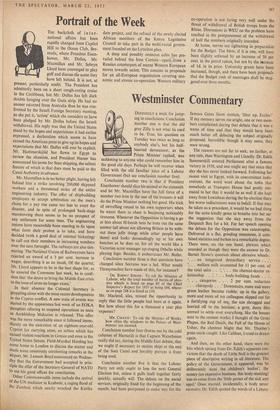Portrait of the Week
THE backcloth of inter- national affairs has been rapidly changed from Capitol Hill to the Ocean Club, Ber- muda, where President Eisen- hower, Mr. Dulles, Mr. Macmillan and Mr. Selwyn Lloyd have converged to play golf and discuss the scene they have left behind. It is not, at present, particularly sunlit. The President has admittedly been on a short cough-curing cruise in the Caribbean, but Mr. Dulles has left dark doubts hanging over the Gaza strip. He had no sooner returned from Australia than he was con- fronted by the Israeli Foreign Secretary wanting, as she put it, 'action' which she considers to have been pledged by Mr. Dulles before the Israeli withdrawal. His reply was that the United States stood by the hopes and expectations it had earlier expressed, a declaration which seems to have caused the American press to give up its hopes and expectations that Mr. Dulles will ever be explicit. Mr. Hammarskjold has flown to Egypt to review the situation, and President Nasser has announced his terms for Suez shipping, the salient feature of which is that dues must be paid to the Canal Authority in advance.
Mr. Macmillan is in no better plight, having left behind him a strike involving 200,000 shipyard workers and a threatened strike of the entire engineering industry. The offer of shipbuilding employers to accept arbitration on the men's claim for a pay rise came too late to avert the disaster, and in spite of prolonged back-stage manoeuvring there seems to be no prospect of any settlement for some time. The engineering unions have meanwhile been meeting to fix upon what form their protest is to take, and have decided (with a good deal of internal bickering) to call out their members in increasing numbers over the next fortnight. The railways are also sim- mering. The National Union of Railwaymen have rejected an award of a 3 per cent. increase in wages, describing it as an insult., Of the quartet, Mr. Lloyd appears to be in the best shape for, as he assured the Commons last week, he is confi- dent that 'the desire to bring the Middle East crisis to the issue of arms no longer exists.'
In their absence the Colonial Secretary is grappling alone with the most recent developments in the Cyprus conflict. A new train of events was started by the appearance last week of an EOKA pamphlet offering to suspend operations as soon as Archbishop Makarios is released. This offer was the more remarkable since it followed imme- diately on the execution of an eighteen-year-old Cypriot for carrying arms, an action which has caused violent reactions in Greece and even in the United States Senate. Pield-Marshal Harding has come home to London to discuss the matter and made some ominously unrelenting remarks at the airport. Mr. Lennox-Boyd announced on Wednes- ' day that the Government had accepted in prin- ciple the offer of the Secretary-General of NATO to use his good offices for conciliation.
Other Commonwealth items include the arrival of the UN mediator in Kashmir, a raging flood of the Zambesi which nearly wrecked the Kariba dam project, and the refusal of the newly elected African members of the Kenya Legislative Council to take part in the multi-racial govern- ment founded on the Lyttelton plan.
A deep and possibly ominous calm has pre- vailed behind the Iron Curtain—apart Arom a Russian counterpart of recent Western European moves towards union. This consists in proposals for an all-European organisation covering eco- nomic and atomic co-operation. Western military co-operation is not faring very well under the threat of withdrawal of British troops from the Rhine. Discussions in WEU on the problem have resulted in the postponement of the withdrawal of half the numbers originally intended.
At home, nerves are tightening in preparation for the Budget. The blow, if it is one, will have been slightly softened by an increase of 50 per cent. in the petrol ration, but not by the increase of Id. in its price. University grants have been increased, though, and there have been proposals that the Budget rush of marriages shall be stag- gered over three months.


































 Previous page
Previous page